-
SFFS New Italian Cinema Nov. 13-17, 2013

San Francisco Film Society
NEW ITALIAN CINEMA
Nov. 13-17, 2013
LINKS TO REVIEWS:
Ali Blue Eyes (Claudio Giovannesi 2012)
Balancing Act (Ivan De Matteo 2012)
Cosimo and Nicole (Francesco Amato 2012)
Garibaldi's Lovers (Silvio Soldini 2012)
Great Beauty, The (Paolo Sorrentino 2013)
Ideal City, The (Luigi Lo Cascio 2012)
Interval, The (Leonardo Di Costanzo 2012)
Out of the Blue (Edoardo Leo 2013)
Steel (Stefano Mordini 2012)
There Will Come a Day (Giorgio Diritti 2012)
General Forum notification and comment thread for this series here. Links to the Filmleaf reviews also below.
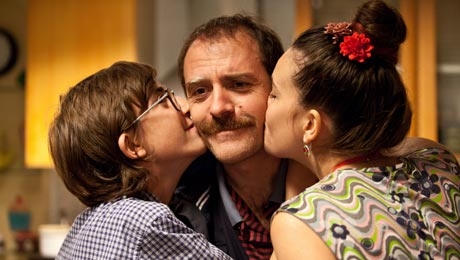
Garibaldi's Lovers
Silvo Soldini (Il comandante e la cicogna, Italy/Switzerland 2012)
The director of 2007’s hard-hitting Days and Clouds takes a more comedic, though similarly pointed and critical, look at contemporary Italian society with this dual story of a Genoan plumber trying to raise his two kids after the death of his wife and a starving artist who is hoping for a lucrative new commission.
Wednesday, November 13, 6:15 pm
Landmark's Clay Theatre
2261 Fillmore (Sacramento/Clay)
Silvio Soldini's Days and Clouds I reviewed in the NYC Lincoln Center Open Roads New Italian Cinema series of 2008 here.
Napoli 24
Multiple Directors (Italy 2010)
Over three years in the making and completed with great difficulty during the infamous garbage crisis, this omnibus film pays tribute to one of the world’s most magnificent and complicated metropolises.
Wednesday, November 13, 9:00 pm
Landmark's Clay Theatre
2261 Fillmore (Sacramento/Clay)
Balancing Act
Ivano De Matteo (Gli equilibristi, Italy 2012)
The financial precariousness of middle-class life is thrown into dramatic relief in this powerful drama about life, love and family.
Thursday, November 14, 6:30 pm
Landmark's Clay Theatre
2261 Fillmore (Sacramento/Clay)
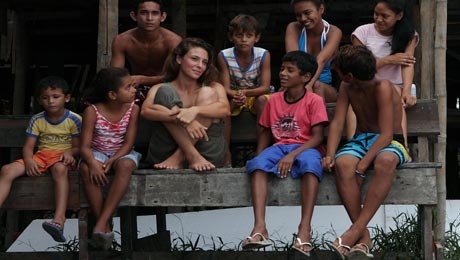
There Will Come a Day
Giorgio Diritti (Un giorno devi andare, Italy/France 2013)
After a tragic personal event, a young woman named Augusta (Jasmine Trinca) flees Italy for the Brazilian Amazon to give medical assistance to the indigenous population and to try and restore meaning to her life.
Thursday, November 14, 8:45 pm
Landmark's Clay Theatre
2261 Fillmore (Sacramento/Clay)
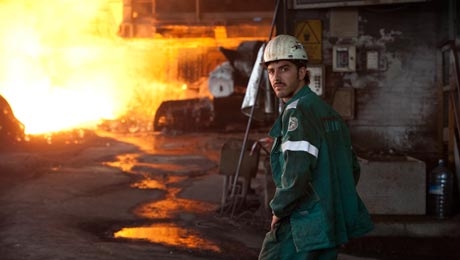
Steel
Stefano Mordini (Acciaio, Italy 2012)
With the downward-slanting economy as a backdrop and fraught sexual tensions in the forefront, Steel delves deeply and expertly into the vagaries of interpersonal, small-town relationships.
Friday, November 15, 6:30 pm
Landmark's Clay Theatre
2261 Fillmore (Sacramento/Clay)
Cosimo and Nicole
Francesco Amato (Cosimo e Nicole, Italy 2013)
This drama about an obsessive relationship that takes a dark turn is grounded by two powerhouse performances by Riccardo Scamarcio and Clara Ponsot and directed with urgency by Francesco Amato.
Friday, November 15, 9:00 pm
Landmark's Clay Theatre
2261 Fillmore (Sacramento/Clay)
We Believed
Mario Martone (Noi credevamo, Italy/France 2010)
Made to coincide with Italy’s 150th anniversary celebration, this epic 19th-century costume drama tells the story of the country’s path to independence.
Saturday, November 16, 12:15 pm
Landmark's Clay Theatre
2261 Fillmore (Sacramento/Clay)
Ali Blue Eyes
Claudio Giovannesi (Alì ha gli occhi azzurri, Italy 2012)
Working with a non-professional cast using incidents from their lives, Claudio Giovannesi paints a revelatory picture of existence for the various cultures trying to live together in present-day Italy.
Saturday, November 16, 4:15 pm
Landmark's Clay Theatre
2261 Fillmore (Sacramento/Clay)
Out of the Blue
Edoardo Leo (Buongiorno papà, Italy 2013)
A slick ladies’ man learns new responsibilities in this warm crowd-pleaser from the director of 18 Years Later (NIC 2010).
Saturday, November 16, 6:30 pm
Landmark's Clay Theatre
2261 Fillmore (Sacramento/Clay)
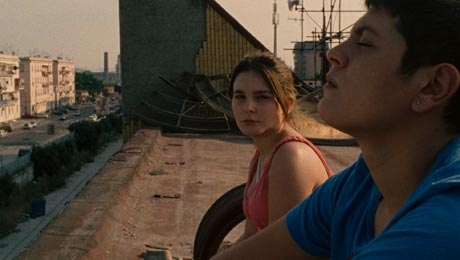
The Interval
Leonardo di Costanzo (L’intervallo, Italy/Switzerland/Germany 2012)
Inside the walls of an abandoned Naples boarding school, a 17-year-old street vendor must spend the afternoon watching over a pretty 15-year-old who is being sequestered for reasons unknown to him.
Saturday, November 16, 9:00 pm
Landmark's Clay Theatre
2261 Fillmore (Sacramento/Clay)
Gorbaciof
Stefano Incerti (Italy 2010)
Returning to film’s visual essence, cowriter/director Stefano Incerti depicts the life of a Neapolitan prison cashier named Marino with sparseness and immediacy, bolstered by Toni Servillo’s impeccable performance
Sunday, November 17, 1:00 pm
Landmark's Clay Theatre
2261 Fillmore (Sacramento/Clay)
The Ideal City
Luigi Lo Cascio (La città ideale, Italy 2012)
Actor Luigi Lo Cascio’s (The Best of Youth) directorial debut is a wonderfully unclassifiable work, rich with philosophical ideas and punctuated by the increasing precariousness of his protagonist's situation.
Sunday, November 17, 3:00 pm
Landmark's Clay Theatre
2261 Fillmore (Sacramento/Clay)
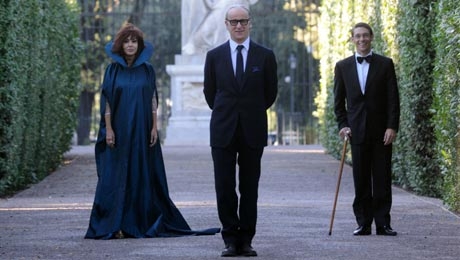
The Great Beauty
Paolo Sorrentino (La grande bellezza, Italy/France 2013)
Employing elegant cinematography and a brilliantly wide-ranging score, director Paolo Sorrentino has created a phantasmagoric feast for the senses, a tribute to the Eternal City that will surely have a long life of its own
Sunday, November 17, 6:00 pm
Landmark's Clay Theatre
2261 Fillmore (Sacramento/Clay)
One Man Up
Paolo Sorrentino (L'uomo in più, Italy 2001)
With surreal dream sequences and potent ideas about destiny and morality, One Man Up is a dark and ambitious (and rarely screened) film that heralded the brilliant careers of director Paolo Sorrentino and star Toni Servillo that were to come.
Sunday, November 17, 9:30 pm
Landmark's Clay Theatre
2261 Fillmore (Sacramento/Clay)
I reviewed Paolo Sorrentino's 2012 This Must Be the Place here.
Last edited by Chris Knipp; 01-02-2015 at 04:08 PM.
-
GARIBALDI'S LOVERS (Silvio Soldini 2013)
SILVIO SOLDINI: GARIBALDI'S LOVERS (2013)
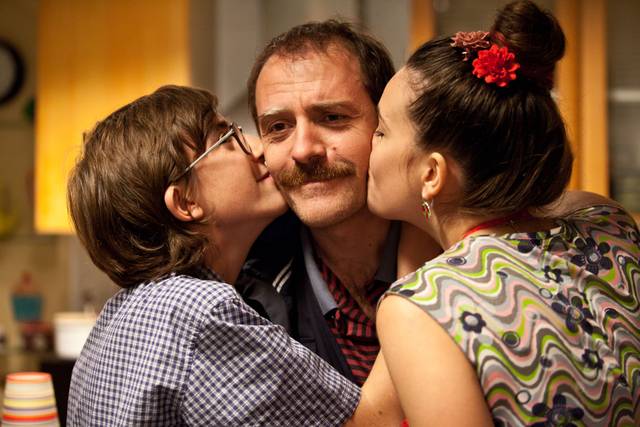
Luca DiRodi, Valerio Mastndrea and Derena Pinto in Garibaldi's Lovers
Social commentary in a comedy that's a tad too whimsical
"The director of 2007’s hard-hitting Days and Clouds takes a more comedic, though similarly pointed and critical, look at contemporary Italian society with this dual story of a Genoan plumber trying to raise his two kids after the death of his wife and a starving artist who is hoping for a lucrative new commission." So says the blurb. Yes and the skinny, bespectacled son of Leo (Valerio Mastandrea), the plumber, whose name is Elia (Luca Dirodi), has adopted a stork he has named Agostina (he calls her "Aga" for short), that he feeds stolen frogs to because he thinks she's eating polluted food. (Props to the filmmakers for crane-wrangling.) The "starving artist" is Diana (Alba Rohrwacher), who makes repeated appeals to get paid for a job for a bankrupt employer who's taken off by the cops, and then gets a new one to do a mural for a lawyer. Leo's daughter Maddalena (Serena Pinto) has a boyfriend who turns out to be a detective working for the city and investigating real estate fraud. Leo's deceased wife Teresa (Claudia Gerini) isn't completely gone: she appears to Leo in a bikini and rides with him in his truck sometimes.
Going from his winningly whimsical love comedy Bread and Tulips (2000), which a lot of people saw, and his meandering but interesting 2007 social drama about upper middle class financial woes Days and Clouds, (NIC New York, 2008) which not as many saw but also got US distribution and good reviews, through several other films we haven't gotten to see for what may be obvious reasons, Soldini has turned ever more surreal and whimsical-- to the point that this one is so out there it makes you shake your head. The incomprehensible new English title seeks clumsily to make up for the somewhat head-scratching original Italian one, which means "The Commandant and the Crane."
It actually makes sense when you see the m ovie. The Commandant is Garibaldi, the Italian 19th-century liberator, and a statue of him and one of Leonardo and another of the poet Leopardi (voiced successively by Pierfrancesco Favino, Neri Marcorè and Gigio Alberti) occasionally ruminate disapprovingly down upon their northern Italian cityscape when Elia is not running around after his crane, or the pompous landlord, Amanzio (Giuseppe Battiston), who shoplifts expired items from the supermarket, isn't lecturing people, or the starving artist (who's the landlord's tenant) isn't trying to raise her rent, or Leo, who has a Chinese helper called Fiorenzo (Yang Shi), isn't trying to keep his household together. Whether their frantic meanderings justify the noble dead Italians' disapproving generalizations about the sad state of Italy today is hard to say. It's not easy to see any connection, really. There are many indications that Soldini's writing on this film was ill coordinated with that of co-writer Doriana Leondeff (who collaborated on Bread and Tulips and Days and Clouds) and Marco Pettenello (who who penned Carlo Mazzacurati's 2010 The Passion).
All this, though good natured, is so flighty, alternatively pretentious, or obviously made-up and silly that it starts to seem a prime example of why these days even Italians aren't going much to Italian movies and apart from exceptions like Divo and Gomorrah or this year's The Great Beauty they unfortunately are only sporadically making it into major festivals other than the ones devoted to Italian movies and co-run by Italian consulates.
Swiss money was contributed for the funding of this picture, which explains why the crane flies off to the German part of Switzerland and has to be retrieved. Amanzio, the pompous, do-nothing landlord, who's quite a kindly sort when he chooses to be, and also a considerable linguist, helps Elia comunicate with the Swiss Germans on the phone, long distance, after the Germans have found Elia's cell phone number around "Aga's" neck. The sets are as willfully elaborate and quirky as the plot line.
Il commandante e la cicogna, 105 mins., was released in Italy 18 Oct. 2012. Screened for this review as part of the New Italian Cinema series of the San Francisco Film Society, Nov. 2012.
Last edited by Chris Knipp; 01-02-2015 at 04:10 PM.
-
BALANCING ACT (Ivano de Matteo 2012)
IVAN DE MATTEO: BALANCING ACT (2012)
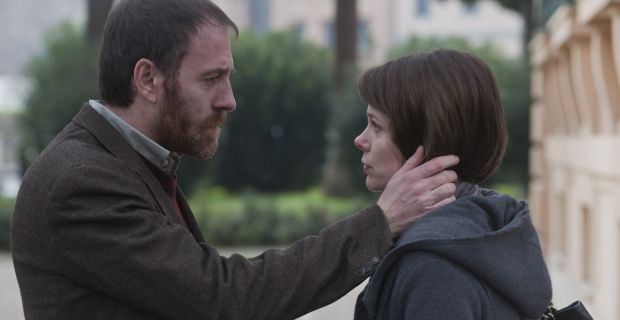
Valerio Mastrandrea and Barbora Bobulova in Balancing Act
A thin margin for the urban middle class man: "Divorce is for the rich"
Balancing Act (Gli equilibristi) is a sad one. Here is a hangdog side to the Italian male that foreigners may be surprised to see, having become accustomed to the fantasy of the dashing seductive charmer, the flashy dresser with the flashing eyes. But even Marcello Mastroianni had a hangdog side. Playing Giulio, Valerio Mastandrea, who won the Best Actor Davide, the Italian "Oscar" for this performance, is more of an average guy. He played the husband in Kim Rossi Stewart's fine and touching directing debut Anche libero va bene took so he's no stranger to difficult marriage dramas, though he's a comedian by trade. "The financial precariousness of middle-class life is thrown into dramatic relief in this powerful drama about life, love and family." Yes, this man has a brief infidelity, and his "northern" wife Elena (Barbora Bobulova) cannot learn to live with it, and so they must split, leaving the wife with the rocker girl daughter Camilla (the vibrant Rosabell Laurenti Sellers) and her little blond brother Luca (the sweet Lupo De Matteo) with the expensive retainer to correct his teeth.
Giulio is a city worker and Elena is a receptionist and they live in Rome, whose tough, funny, sometimes disreputable side is shown with no touristic facades here. Balancing Act is a process film and the process is a devolution. Giulio is a nice, restrained man, but also the victim of his occasional impulses. First is his infidelity with Stefania (Grazia Schiavo), not really a girlfriend, it seems, just a lonely lady with a dog who he spent some time with. One evening he has pity on a pizza man who brings the wrong order and the anchovies Elena can't eat push her over the edge. This wrong decision, taking somebody else's pizzas, leads to his expulsion. He stays with a friend at first, a single man tyrannized by his ancient "mamma." He must flee to other lodgings and the only thing he can afford is a prison-like pensione. But he can't afford that and before long he is sleeping in his car and eating at welfare stations to pay the double set of bills he's saddled with. He suffers a hundred humiliations, yet cannot succeed, and he deteriorates psychologically.
Balancing Act is a more downscale version of the story Silvio Soldini told in Days and Clouds -- how even well off middle class people can have their livelihoods kicked out from under them and slip into a marginal working class existence. This could be soap opera, melodrama, but what holds it, precariously, above that level are all the excellent performances and the writing that is precise about each social detail, in particular the personalities of salty Romans.
But though this film avoids becoming a soap or melo it's also certainly no neorealist masterpiece. Despite the good acting, the specific writing, nuanced mise-en-scène, and Vittorio Omodei Zorini’s subtle and inventive but not obtrusive camera, something seems missing, too monotonous. There is too little emotion, too much repression. This was released in France in February 2013, and the Paris critics were only mildly impressed (Alloociné's press rating is 3.0). One French critic felt we merely become voyeurs of a sadistic process of humiliation. Several suggested that Balancing Act, falls into a kind of miserabilism and finally does not go enough beyond the documentary, illustrative limits of its sociological tale. I feel this too: that there is too much detail and not enough art.
Gli equilibristi/Balancing Act, 107 mins., debuted at Venice 2012 and opened theatrically in Italy Sept. 2013 and France Feb. 2013. Screened for this review as part of the New Italian Cinema series of the San Francisco Film Society presented at the Clay Theater in San Francisco 14 Nov. 2013.
Last edited by Chris Knipp; 01-16-2016 at 05:14 PM.
-
THERE WILL COME A DAY (Giorgio Diritti 2012)
GIORGIO DIRITTI: THERE WILL COME A DAY (2012)
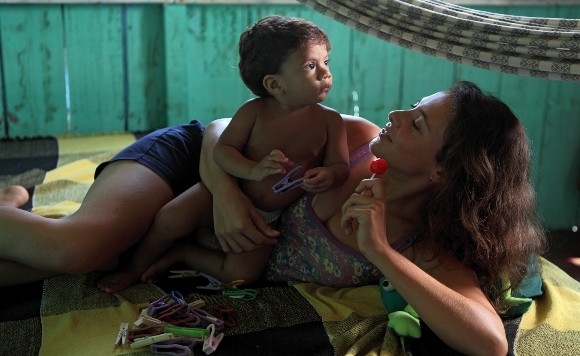
Jasmine Trinca in There Will Come a Day
Artful "Eat Play Love," Italian style
Giorgio Diritti's previous film, his sophomore effort, told a wartime story of a German massacre of Italian peasants. The Man Who Will Come/L'uomo che verra (SFIFF 2010), used authentic locals from the Appenine mountains near Bologna talking in impenetrable dialect. And again in this new more ambitious effort set in the present and largely filmed in Brazil Diritti makes much use of documentary material and a meandering non-structure. The Man Who Will Come won the Grand Jury Prize at Rome in 2009 despite a lack of narrative drive. I frankly find Diritti's style in both films original, but showy, self-indulgent and aimless; others are entranced and see this new film as a beautiful meditation and a visual poem depicting a profound spiritual and human journey. It does contain some very interesting footage. But it seems to me ultimately much too pretentious and full of itself.
What we can all agree on is that Diritti's one constant point of reference, apart from the authentic Amazon locations and indigenous people, is the beautiful young Italian woman, Augusta (Jasmine Trinca), who's running from a trauma. She's recently lost a child and learned she can't have another and at the news her husband has chosen to leave her. (Rumor has it that Diritti is basing this film partly on a previous journey here in flight from a trauma of his own, when he shot a documentary.)
Augusta's mother Anna (Anne Alvaro) in Bologna has apparently arranged for her to join an old friend of hers, a Catholic nun, Suor Franca (Pia Engleberth), who travels, gives medical help, and teachers. For a while, in a succession of authentic scenes, we see Augusta and the no-nonsense sister cruise the Amazon in a boat visiting and helping the Indios. But the liaison of the two women doesn't last. Augusta likes helping the Indios, but sees no point in inculcating in them as Suor Franca does Christian doctrines like sin and the divinity of Jesus. Besides, there are other problems. Evangelicals are driving the Catholics out, while the Catholics, including Suor Franca, are hand-in-glove with hotel developers who blatantly exploit the indigenous people for their own commercial ends. Another issue that will come up later is that there is a traffic in children, who disappear when they're sold for foreigners to adopt them.
I find Augusta selfish, and this film a more highfalutin, art house Italian version of Eat Play Love. Augusta isn't doing a job, however in part dubious, like Suor Franca. She's finding herself.
Leaving Suor Franca and rarely bothering to communicate with her concerned mamma back in Italy, Augusta winds up with a family in a favela in Manaus, the capital city of the state of Amazonas,whose inhabitants live in houses on stilts over stagnant water. Again Diritti provides much documentary detail using non-actors but has little use for narrative. This film moves by bits of information rather than events and jumps between Italy and Brazil with a maddening casualness that others take as a poetic meditation heightened by Jasmine Trinca's pretty, inward-looking face. In many ways this is another Eat Pray Love, but the taciturn Jasmine Trinca is no Julia Roberts, and doesn't do much eating or praying. She does read a book by the French Christian mystic Simone Weil (this is a French-Italian co-production).
With the extended family in Manaus, which seems to have no trouble taking her in, Augusta is happy, and they treat her like a cross between a sister and a princess. She attaches herself to pretty young mother Janaina (Amanda Fonseca Galvao), and her heart seems to flutter for the chubby, naive João (Paulo De Souza), the young breadwinner, who has a brilliant smile and stylish hair. The conversations often seem improvised, not scripted, though the scenario is attributed to Giorgio Diritti, Fredo Valla, and Tania Pedroni. The sometimes gorgeous cinematography is by Roberto Cimatti. The Manaus sequence, which has much sociological as well as emotional content, is more original than the earlier material. But it oscillates between interesting and merely aimless. At some point the film begins to feel bloated, even though it has accomplished a lot in the first fifty minutes, and in Manaus there is amazing footage of the start of the rainy season. Meanwhile we still have to deal with constant suddenly recurrent short scenes of Augusta's sad-sack mamma back in Italy, who's caring for her mother (Sonia Gessner). And then a predictable tragedy happens to Janaina, leading to more and more back-and-forth cutting.
Un giorno devi andare/A Day Will Come (literally "One day you must go"), 109 mins., debuted at Sundance Jan. 2013, opened theatrically in Italy in March; Karlovy, Vancouver, Chicago festivals. Screened for this review as part of the San Francisco Film Society's New Italian Cinema series, Nov. 14 at the series venue, Landmark's Clay Theatre at 2261 Fillmore St.
Last edited by Chris Knipp; 01-02-2015 at 04:16 PM.
-
THE GREAT BEAUTY (Paolo Sorrentino 2013)
PAOLO SORRENTINO: THE GREAT BEAUTY (2013)

Sorrentino and Servillo's tremendous Roman trifle
"The movie is a masterpiece, a grand swooning epic, lush to the point of insanity, Fellini turned up to 11," says The Guardian's Catherine Shoard of Sorrentino's triumphant new collaboration with the great Toni Servillo, La grande bellezza, perhaps the best, certainly the grandest, thing Sorrentino has done and the best thing he and Servillo have done together.
Warning: it's long (142 minues) and you may be bored, or feel overfed. "Lush to the point of insanity" means the images and scenes are over-rich, their ancient Roman gilded gorgeousness mitigated only by the dry urbanity of Jep Gambardella, Servillo's character and the film's urbane protagonist. Jep is originally from Naples, like the director himself (and slips in and out of a Neopolitan accent), but has lived in Rome long enough to know everyone in its society worth knowing. He's a well-known but lazy and snobbish journalist who once, forty years ago, wrote a novella that was much admired and is still sometimes remembered. Why has he done nothing like that since? Ah, yes: good question.
Most of Jep's energy seems to go into dressing impeccably -- the pleasure of observing his succession of elegantly casual, impeccably tailored jackets and suits and ties and shoes is itself worth the price of admission -- and partying till the wee hours every night with tough, middle-aged, a bit too tan, perfectly botoxed models of mondanità," society life, of which Jep himself long ago decided to be a prime exemplar. Jep is a modern Marcello Mastroianni and this is a stylized, technicolor La Dolce Vita. But this is not what Pauline Kael called the "sick soul of Europe." Rather it's Italy, as they like to say now, "in a very difficult period of transition." In other words, in a prolonged state of spiritual, moral, and aesthetic exhaustion of which Berlusconi (not mentioned here--this isn't a Nanni Moretti film) may be highly symbolic. It's a country stifled by its cultural history, with so much beauty, it lacks the energy to make anything new any more.
And so, exemplifying the state of Italian affairs -- and Sorrentino has taken on no lesser task, though this is far too beautiful, witty, and inventive a film to editorialize or document -- this movie can't really, and doesn't, go anywhere. But it's a very lovely, cinematically splendid and surprisingly graceful and pleasurable ride. I watched it with a smile on my face, because a beautifully made film makes me happy.
There is no spiritual crisis, as in Fellini's classic, and Sorrentino does wide panning shots but not long rambling takes. He does a succession of short scenes with Jep in all those outfits and at all those parties. The opening one is a carnivalesque disco celebration of his sixty-fifth birthday. There are various moments, including a magician at the Colosseum who makes a giraffe disappear and a 104-year-old Mother Teresa-surrogate at a dinner party. But the decisive one for Jep is when he's informed that an old girlfriend he's been in touch with for decades but who married another man has died. Flashbacks to that early love may suggest why Jep has lost himself in lazy urbane pleasures and never really "done" anything.
But it's also suggested that Jep's pleasurable otium (and Jep's urbane smiles are another of the film's distinctive, memorable pleasures) is in the nature of the city of Rome itself. The city is too culturally rich and beautiful and lazy to allow its inhabitants the space to do anything. (Factually, remember Turin and Milan are where Italian industry and fashion happen, and Rome's Cinecittà doesn't seem to be a mine of energetic accomplishment these days.)
There is much else one could describe, including Jep's best friend, the explicitly named Romano (Carlo Verdone, by trade a comedian, and a quintessentially Roman one), who's an aspiring playwright; and the literary references to Proust, Céline, Dostoyevsky, and Sartre -- partly mocking the self-importance of the Fellini-esque model. But one can't encompass this cornucopia of scenes and celebrations in a review. All one can say is, if you love lush and impeccably stylish cinematic excess, and have the patience, and if you wish to be up on the latest and best in Italian filmmaking, you should see La grande bellezza at your earliest convenience in a cinema with a nice big screen. It is a great beauty of a film, right down to the last slow gliding moments of the end credits.
La grande bellezza, 142 mins., debuted in competition at Cannes May 2013 (and was nominated for the Palme d'Or). Released in various European countries; other international festival showings. Metacritic (English and American reviews): 82; Allociné (French critics): only 3.4 (the Cahiers critic hates Sorrentino). US release by Janus Films. Screened for this review at a preview at Landmark's Embarcadero Cinemas in a renovated auditorium with posh new seats and a nice big screen in San Francisco 12 Nov. and included in the SF Film Society's New Italian Cinema series Sunday, November 17, 6:00 pm at Landmark's Clay Theatre. Landmark Theater showings of the film begin 29 Nov.
See Mike D'Angelo's AV Club Cannes report on the film's editing, opening scene, and camera style.
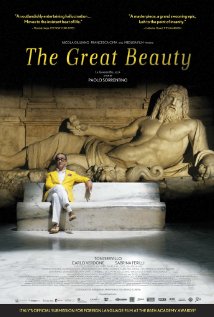
Last edited by Chris Knipp; 01-02-2015 at 04:20 PM.
-
STEEL (Stefano Mordini 2012)
STEFANO MORDINI: STEEL (2012)
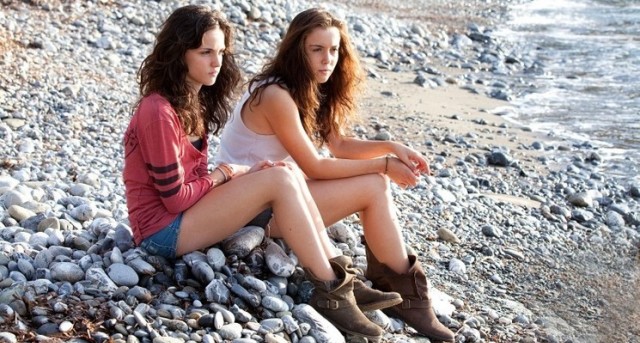
Anna Bellezza and Batilde Giannini in Steel
Coming of age by the steel mill, and by the Mediterranean
Steel (Accaio), a feature by Stefano Mordini, formerly a documentary filmmaker, centers upon the small industrial town of Piombino, along the coast, southwest of Siena, in view of the island of Elba. Vacationers pass through but don't stop. In the foreground are two sexy 14-year-old girls, Anna (Matilde Giannini) and Francesca (Anna Bellezza), best friends, who study at school and dream of escaping, while finishing their last summer after middle school and before entering the liceo. Anna's older brother Alessio (an excellent Michele Riondino) not only works at the Lucchini steel mill but at night steals electrical cable to earn extra money, whose source he hides from his mother. The father, apparently a drunk, is off somewhere seeking his fortune away from the factory and no longer in touch. A declining economy and technological unemployment trouble the area's longtime source of livelihood.
Mordini is interested in family and friend relationships and undercurrents of discontent. But a certain working class grimness of surroundings is offset by the eye candy of the girls and the young men, with breathless closeups of faces and bodies that Ken Loach or the Dardennes would not have bothered with and which spoil what could be a truly authentic setting by introducing a soapy flavor. There are even softcore porn undressing scenes and sexy semi-nude men and the girls kissing to lend a light lesbian touch. We may be in a community dependent on a steel mill, but the girls wander around in the sexy outfits of the day, booties, loose T's, tiny jean shorts, and strip to swim in the Mediterranean. Things for them aren't so bad, except, like all teenagers, they're bored. They lounge around lazily and sexily on their beds, or exchange blank looks.
Clearly Mordini is seeking to combine a moody coming-of-ager with realistic semi-documentary depictions of the working class milieu, but he seriously undercuts it with the desultory unfolding of scenes and the come-hither photography of attractive young male and female flesh -- which, however, does not conceal the diagrammatic, expository nature of the fragmentary dialogue.
The most ambitiously shot and edited sequence in a skating rink, when the two girls betray and desert each other and follow different attractions, achieves a brief sense of complexity and urgency, and then typically is suddenly dropped, the next scene in the light of day of the girls' housing unit, as if nothing had happened. Later, a trip to Elba for the two girls is cancelled in favor of Anna's birthday sexual debut with a returned friend of Alessio's, Mattia (Francesco Turbanti) who now works at the factory. There's also Alessio's super-pretty blonde ex-girlfriend, Elena (Vittoria Puccini), who returns to join the factory's management staff and can't understand Alessio's contentment with the steel mill worker life. These are quickly sketched events. They can seem superficial, but Mordini also can surprise with his rapid jump cutting, as when he suddenly shows Anna in school studying Latin. All this complexity is interesting and the film despite its visual missteps has delicacy, but it fails to tell a compelling story -- as Ken Loach or the Dardennes definitely would have done.
Steell is an adaptation of the novel by the same name by Silvia Avallone, which won the Italian Campiello prize in 2010 and readers' prizes from the French magazines L'Express and Elle in 2011 and 2012. From the novel, judging by comments from those who've read it, little remains here of its real in-depth focus on the factory life. Scenes of the foundry are pasted in, with Alessio occasionally there wearing the Lucchini factory uniform and interacting with secondary characters, but otherwise there's little integration of the factory's gritty dirt and swing-shift exhaustion into the scenes of home life. The oscillation between the depressing factory setting and its depressed social world and the sensuality of the young girls in bloom weakens both and confounds the viewer. The over-intimate photography, good at other times, is by Marco Onorato.
Accaio, 95 mins., debuted at the Authors' Week at Venice, Sept. 2012. It opened in Italy 15 Nov. 2012, and in France (as D'Acier 5 June 2013 (Allociné press rating: 3.2). Screened for this review as part of the San Francisco Film Society's New Italian Cinema series, November 2013, in which is shows Friday, November 15, at 6:30 pm at Landmark's Clay Theatre.
Last edited by Chris Knipp; 01-02-2015 at 04:22 PM.
 Posting Permissions
Posting Permissions
- You may not post new threads
- You may not post replies
- You may not post attachments
- You may not edit your posts
-
Forum Rules










 Reply With Quote
Reply With Quote






Bookmarks